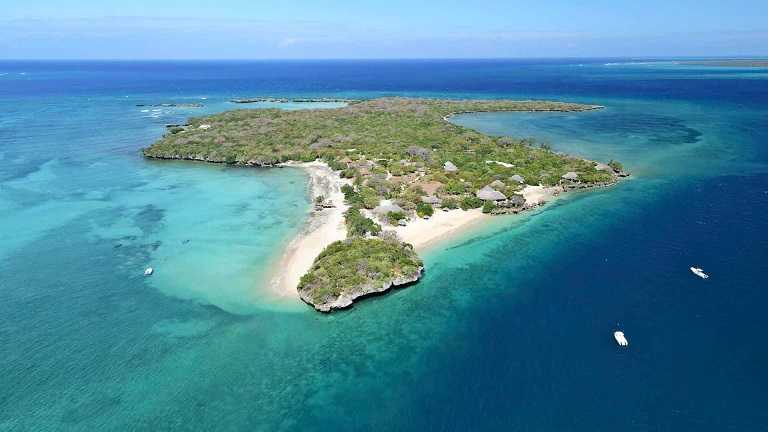Off the coast of Mozambique lies the archipelago of the Quirimbas Islands, which comprises 27 islands in all. A national park was created in 2002 to protect these mostly uninhabited places.
With its paradisiacal islands dotting a sea of azure, its bushy mangroves opening onto a pristine white sand, dhows on the horizon and its fairy island of Ibo, the distant archipelago of Quirimbas is a place apart, geographically and temporally. Difficult to access, we leave it with regret. Fishing in the middle of corals, sandy Ibo, relaxation in a luxury lodge or discovery aboard a dhow, the archipelago does not fail to enchant.
Northern Mozambique is more geared towards experienced travelers. It will take several days of travel to cross the Zambezi River and reach Ilha do Mozambique. This island, where many slaves were deported, has kept its quaint colonial charm.
Going up the hill, you reach Pemba, near the Tanzanian border. The city faces the sublime archipelago of Quirimbas, still preserved jewel of the Indian Ocean. Finally, by going west, we reach Lake Malawi, a very wild reserve.
Advices:
- The North of the country is recognized for its local crafts, especially the sculptures produced by the people of Makondo ...
- The Island of Mozambique and Ibo Island contain fascinating accounts of the history of slavery in Africa ... take the time to visit them!
- The Archipelago of Quirimbas will offer you "dhaws sadari": an original and quiet way to discover the marine fauna and flora !!!
A former Portuguese colony, Mozambique is a country in southern Africa with over 2000 km of coastline bordered by the Indian Ocean. Unknown and still preserved from major tourist flows, Mozambique is a paradise of white sand, turquoise water and small islands well preserved, especially in the archipelagos of Bazaruto and Quirimbas. It is an ideal destination for diving and snorkelling enthusiasts as well as for a relaxing beach holiday after a safari.
When to go?
Mozambique benefits from a tropical climate. The seasons are the opposite to those in Europe since it is located in the southern hemisphere.
The best time to go to Mozambique is between May and November: temperatures are not too high and the climate is dry. Avoid the rainy season, which lasts between December and March, during which the roads can collapse and some areas become flooded.
The peak tourism season is summer (winter in Europe) between the Christmas holidays and the new year. If you have a limited budget avoid this period because availability is low and prices are rising considerably.
Formalities
The visa is compulsory for any type of passport (even diplomatic or service) and must be requested from the diplomatic or consular representative of Mozambique competent for your country of residence. The visa upon arrival at the airport is possible but is not guaranteed so it is safer to ask for it at the embassy.
Your passport must also be valid 3 months after the end of your stay in Mozambique.
The visa is subject to a fee and can be single entry or multiple entries.
Health
Yellow fever vaccine is compulsory only if you have been in a country where it is rampant. To see the list, visit the Institute Pasteur website. https://www.pasteur-lille.fr/sante/informations-maladies-voyageurs/
The following vaccines are recommended: DTP (update), typhoid fever, hepatitis A and B, bacterial meningitis A + C + Y + W135.
Dengue and malaria are diseases transmitted by mosquito bites, protect yourself with sprays for skin and clothing and consult your Doctor to find out about your treatment.
Cholera is present in Mozambique, so do not drink tap water but only bottled water. Also avoid eating raw or uncooked foods. Finally wash your hands thoroughly before each meal.
Currency
The currency is the Mozambican metical.
Banks: they are generally open continuously from 8 am to 3:30 pm and Saturday from 7am to noon. Be careful at the end of the month, endless queues are forming in front of the distributors and you could find yourself in front of an empty machine. Cash can be withdrawn from all distributors in the country. Maputo has dozens of them and other major cities are provided with them. Make sure you have cash, especially dollars, widely accepted.
Credit cards: Make sure you have a Visa card; few banks accept the MasterCard. Outside Maputo, credits cards and traveller’s cheques are virtually unusable. Make sure you have cash, especially dollars, widely accepted.
Best rates are in "foreign exchange offices" if you wish to change cash.
Traveller's checks are virtually impossible to change.
In some parts of the country, including the south, in the most touristic places, the metical is competed by the rand. If you are coming from South Africa, you do not need to change your rands. They will be accepted in many hotels and restaurants.
The dollar is also easily exchanged at any bureau de change.
